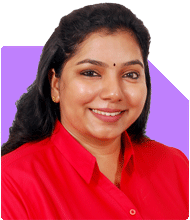How can a 30-year-old engineer with no savings in Chennai start investing for their future?
Ramalingam Kalirajan |7838 Answers |Ask -Follow
Mutual Funds, Financial Planning Expert - Answered on Nov 27, 2024
He has an MBA in finance from the University of Madras and is a certified financial planner.
He is the director and chief financial planner at Holistic Investment, a Chennai-based firm that offers financial planning and wealth management advice.... more

Hi, sir I am a an 30 year old (single) engineer working with a MNC in Chennai, unfortunately till this day i haven't had any savings at all for my future (retirement, other short term or long term goals). Currently my take home salary after EPF and parental insurance is 53k ( EPF is about 4900/month - employee+employer) i haven't opted for Corporate NPS but is provided by the company without any additional contribution from company. I have company health insurance policy and have planned to take my own health insurance and term insurance plan. Adding to above I have zero emergency fund with me. How should I proceed with my investments?
Your current take-home salary is Rs 53,000, and your EPF contribution is Rs 4,900. However, you lack savings, investments, and an emergency fund. Here's a step-by-step strategy:
Build an Emergency Fund
Set aside funds to cover at least six months' expenses.
Start by saving 10-15% of your salary monthly into a high-interest savings account.
Use Recurring Deposits or Liquid Mutual Funds to maintain this fund for emergencies.
Secure Yourself with Insurance
Health insurance: Maintain your company health policy but add a personal health policy. Choose a policy offering a sum insured of Rs 10-15 lakh.
Term insurance: Buy a term plan covering 10-15 times your annual income. Keep the policy simple and avoid investment-linked insurance.
Budget Your Income
Allocate your income carefully for expenses, savings, and investments.
Use the 50-30-20 rule: 50% for needs, 30% for wants, and 20% for savings and investments.
Avoid unnecessary expenses to increase your saving capacity.
Start Investing Gradually
Short-term goals (1-5 years): Invest in debt funds or recurring deposits. Debt mutual funds are good for stable returns.
Long-term goals (5+ years): Invest in equity mutual funds for higher returns. Choose actively managed funds with consistent performance.
Avoid index funds. Actively managed funds have a better potential for higher returns through professional fund management.
Retirement Planning
Utilise the EPF for retirement. Your current contribution will grow over time with compounding.
Consider investing in diversified equity mutual funds for additional retirement savings.
Corporate NPS: You can explore NPS for its tax-saving benefits. However, don’t rely solely on it for retirement.
Tax-Saving Investments
Use Section 80C to save taxes up to Rs 1.5 lakh.
EPF, PPF, ELSS mutual funds, and life insurance premiums can qualify under this section.
Opt for ELSS funds for tax saving and wealth creation.
Review Existing Expenses
Evaluate and minimise unnecessary expenditures.
Avoid loans for discretionary spending like vacations or gadgets.
Advantages of Using a Certified Financial Planner
A CFP can help you plan holistically and ensure you stick to your goals.
They provide tailored strategies, ensuring proper fund allocation and monitoring.
Invest through a Mutual Fund Distributor with CFP credentials to access professional advice.
Key Steps for Discipline
Automate investments through SIPs in mutual funds.
Track your monthly budget and investment progress regularly.
Avoid direct funds. Regular funds offer professional guidance and fund distributor support.
Tax Implications
For equity mutual funds, LTCG above Rs 1.25 lakh attracts 12.5% tax.
STCG on equity funds is taxed at 20%.
Debt fund gains are taxed as per your income slab. Consider these while investing.
Final Insights
You are in the right direction by seeking advice now. Build a solid foundation with savings, insurance, and investments. Take small steps toward financial independence.
Remain consistent with your investments, and review your financial plan annually.
Best Regards,
K. Ramalingam, MBA, CFP,
Chief Financial Planner,
www.holisticinvestment.in
https://www.youtube.com/@HolisticInvestment
You may like to see similar questions and answers below
Ramalingam Kalirajan |7838 Answers |Ask -Follow
Mutual Funds, Financial Planning Expert - Answered on May 26, 2024
Ramalingam Kalirajan |7838 Answers |Ask -Follow
Mutual Funds, Financial Planning Expert - Answered on Jul 29, 2024
Mayank Chandel |1991 Answers |Ask -Follow
IIT-JEE, NEET-UG, SAT, CLAT, CA, CS Exam Expert - Answered on Feb 05, 2025
Mayank Chandel |1991 Answers |Ask -Follow
IIT-JEE, NEET-UG, SAT, CLAT, CA, CS Exam Expert - Answered on Feb 05, 2025
Milind Vadjikar |976 Answers |Ask -Follow
Insurance, Stocks, MF, PF Expert - Answered on Feb 05, 2025
Milind Vadjikar |976 Answers |Ask -Follow
Insurance, Stocks, MF, PF Expert - Answered on Feb 05, 2025
Ravi Mittal |520 Answers |Ask -Follow
Dating, Relationships Expert - Answered on Feb 05, 2025
Ramalingam Kalirajan |7838 Answers |Ask -Follow
Mutual Funds, Financial Planning Expert - Answered on Feb 05, 2025
Pushpa R |49 Answers |Ask -Follow
Yoga, Mindfulness Expert - Answered on Feb 05, 2025
Pushpa R |49 Answers |Ask -Follow
Yoga, Mindfulness Expert - Answered on Feb 05, 2025
Dr Nagarajan Jsk |231 Answers |Ask -Follow
NEET, Medical, Pharmacy Careers - Answered on Feb 05, 2025
Milind Vadjikar |976 Answers |Ask -Follow
Insurance, Stocks, MF, PF Expert - Answered on Feb 05, 2025






















